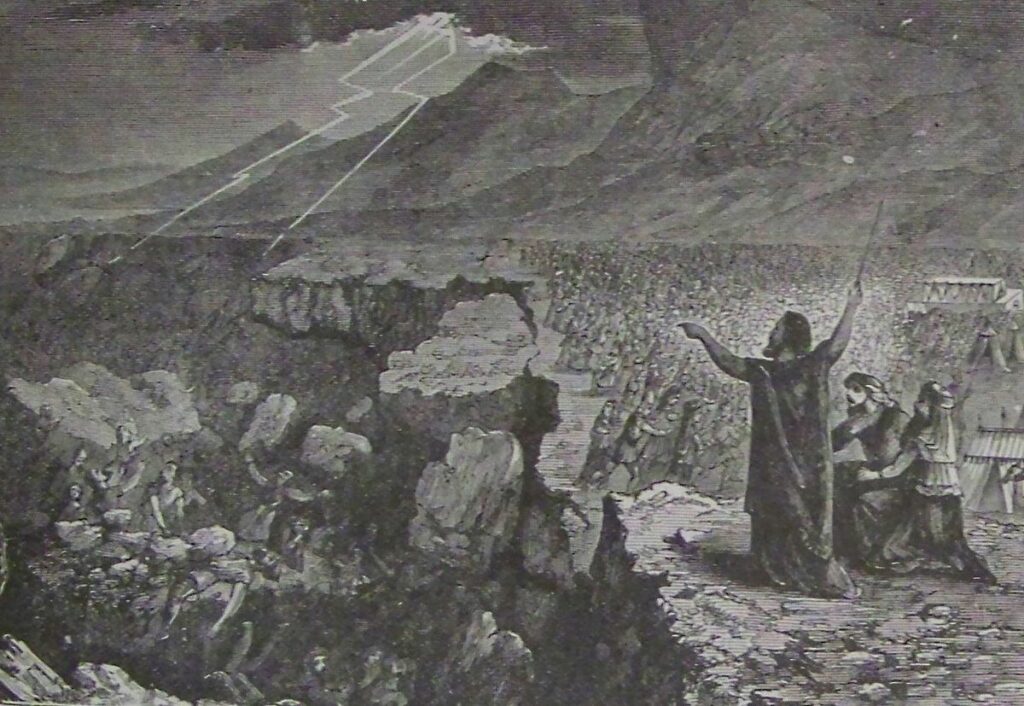
11 For the bodies of those animals whose blood is brought into the holy places by the high priest as a sacrifice for sin are burned outside the camp. 12 So Jesus also suffered outside the gate in order to sanctify the people through his own blood (He 13).
There’s a book in the Christian Scriptures that is written specifically to a Jewish audience; it’s even named “Hebrews.” We don’t know who wrote it (I’m pretty sure Paul didn’t), and we don’t know exactly when it was written (though it appears to have been while the Temple was still in operation [He 10.11], and thus before AD 70) or where (though it was apparently written either from Rome or to Rome [He 13.24]). Even the name “To the Hebrews” was perhaps not original.
But it’s pretty obvious to any reader that it’s a thoroughly Jewish book. By one count there are 229 citations of or allusions to the Hebrew Scriptures in the book’s 13 chapters (that’s an average of 17 per chapter, if you’re counting), beginning in the book’s second verse, which alludes to Ps 2.8, and ending in the final paragraph (specifically He 13.20), which alludes to the eternal covenant mentioned in Ezk 37.26.
It’s a very Jewish book.
We shouldn’t be surprised, then, that if we want to understand the book, we need to understand the Hebrew Scriptures—what Christians call the Old Testament. The passage cited above is a clear example.
Jesus, the author tells us, “suffered outside the gate” in order to set us apart to God through his blood.
What does that mean?
Well, in the previous sentence the writer notes that in the Old Testament sacrificial system, the bodies of animals were “burned outside the camp”—and that Jesus’ death was a designed parallel to that practice.
There are important lessons for us in that parallel. We need to probe this passage by considering the OT practice.
The Hebrew sacrificial system is laid out for us in the book of Leviticus, the third book of the Law of Moses. We find there that the system included several types of sacrifices, which can be categorized in various ways. I like the following structure, which follows the organization of Leviticus itself:
- Voluntary Sacrifices
- Burnt offerings (Le 1)
- Grain / drink offerings (Le 2)
- Peace offerings (Le 3)
- Mandatory Sacrifices
- Sin offerings (Le 4-5.13)
- Trespass offerings (Le 5.14-7.38)
Each type of offering had different requirements—a different “recipe,” if you will. Two of these types are relevant to our passage in Hebrews:
- The burnt offering, which the priests offered twice every day (Ex 29.38-43), was burned completely on the altar; every part of the animal was completely consumed (Le 1.9, 13, 17). Then the ashes were dumped “outside the camp” (Le 6.11).
- The sin offering, which our passage specifically mentions (He 13.11), was handled differently; just the fat and the kidneys were burned on the altar (Le 4.8-10), while the rest of the carcass was burned “outside the camp” (Le 4.11-12).
Occasionally these two types of offerings were executed together; for example, at the priests’ consecration ceremony (Ex 29.10-14; Le 8-9) and on the annual Day of Atonement (Le 16).
Now, this is a lot of work. While Israel was in the wilderness, every single day for 40 years the priests had to cart the ashes of these sacrifices “outside the camp” and dump them—and, for sin offerings, burn them and ensure that they were completely consumed.
How far did they have to drag those carcasses?
Well, if there were 600,000 men in the army at both the beginning (Nu 1.46) and the end (Nu 26.51) of the 40 years in the wilderness, then it seems reasonable that the total number of people was around 2 million. How much area would tents for 2 million people cover? It’s hard to say; how far apart were the tents? Were there latrine facilities throughout the camp, and if so, how far from the tents did they need to be? Lots of variables. But it seems to me that such a group would need at least an area a mile in diameter—which means that from the center of the camp, where the Tabernacle was (Nu 2.2), it would be half a mile or more to the periphery, plus, undoubtedly, further distance to separate the “dump” from the residential tents.
Various animals could be sacrificed, including “herd” animals (Le 1.3, 4.3)—and a bull would weigh hundreds of pounds.
Half a mile. Twice a day.
This action must have considerable significance.
We’ll look at that next time.
Photo by Bakhrom Tursunov on Unsplash






